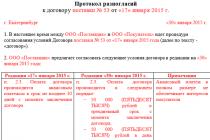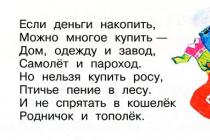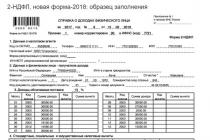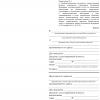Under the Ministry of Finance of the Russian Federation and the Presidential Council of the ISP on December 29, 1997. It includes the following sections:
- Introduction.
- General provisions.
- Target accounting,
- Fundamentals of the organization of accounting.
- The content of information generated in accounting.
- Requirements for information generated in accounting.
- Composition of information generated in accounting for external users.
- Criteria for recognition of assets, liabilities, income and expenses.
- Valuation of assets, liabilities, income and expenses.
As you can see from the content. The concept determined the foundations for building an accounting system in the new economic environment that has developed in Russia. It was based on the latest achievements of science and practice, focused on the market economy model, using the experience of countries with developed market economies, and met internationally recognized principles of accounting and reporting.
Development of accounting and reporting in the medium term
The concept of development of accounting and reporting in Russian Federation on medium term was approved by the order of the Ministry of Finance of the Russian Federation on July 1, 2004 No. 180. It is aimed at improving the quality of information generated in accounting and reporting, and providing guaranteed access to it to interested users.
The concept includes the following sections:
1. The need for further development of accounting and reporting.
2. Purpose and main directions of further development of accounting and reporting.
2.1. Improving the quality of information generated in accounting and reporting.
2.2. Creation of an infrastructure for the application of IFRS.
2.3. Changing the system of accounting and reporting regulation.
2.4. Strengthening quality control financial statements,
2.5. Training and advanced training of personnel.
3. Stages of development of accounting and reporting in the medium term.
The new Accounting Concept and the rules and forms of setting and maintaining accounting developed on its basis by business entities, as well as control over the reliability and reliability of the financial industry, were designed to create elements of a market infrastructure that provide a favorable investment climate in the country.
The procedure for applying international financial reporting standards
Regulation on the recognition of international standards financial reporting and clarifications of international financial reporting standards when applied on the territory of the Russian Federation approved by the Decree of the Government of the Russian Federation dated February 25, 2011 No. 107.
The regulation consists of the following sections:
- General provisions.
- Examination of the applicability of the document of international standards on the territory of the Russian Federation.
- Making a decision on the introduction of a document of international standards into force on the territory of the Russian Federation.
- Publication of an international standards document.
On the basis of the above Regulations, Order No. 160n dated November 25, 2011 of the Ministry of Finance of the Russian Federation provides for the introduction of a number of IFRS and clarifications of international financial reporting standards in the Russian Federation.
The texts of IFRS were registered with the Ministry of Justice of Russia on December 5, 2011, and published in the appendix to the journal "Accounting" No. 12, 2011, which, by order of the Ministry of Finance of the Russian Federation of November 22, 2011 No. 156n, was determined to be the official printed publication for the publication of standards and explanations. According to the editorial staff of the journal, the date of publication can be considered December 20, 2011, when the circulation left the printing house and the required copies were sent out. IFRS texts are also available on the website of the Ministry of Finance of the Russian Federation and in information and reference systems,
On the one hand, this event is perceived as formal due to the fact that it occurs with a delay of several years. For many Russian companies reporting under IFRS has become a regular practice; banks have been reporting under IFRS since 2005; the official translation of the texts of the standards into Russian was available on the website of the International Financial Reporting Standards Foundation and some specialists managed to study IFRS in the original. On the other hand, this is a serious legally significant event that has big influence for the whole Russian system accounting and reporting.
First, IFRS are thus directly entered into the system Russian legislation and in cases stipulated by the relevant acts, have direct effect. Moreover, in certain cases IFRS will replace Russian provisions on accounting and reporting, be used in the development and formation accounting policy organizations.
Secondly, the official entry into force of IFRS in Russia automatically launches the Law of July 27, 2010 No. 208-FZ "On Consolidated Reporting", according to which organizations prepare, present and publish consolidated financial statements in accordance with IFRS, starting with reporting l a year following the year in which IFRS are recognized for use in the Russian Federation, i.e. starting from the financial statements for 2012. Taking into account the requirements of the Standards for the presentation of comparative information for at least one year, the need to prepare financial statements in accordance with IFRS actually arises retrospectively from 2011
At the same time, the consolidated financial statements must be prepared in full compliance with IFRS, i.e. the standards must be applied directly and in all aspects of reporting, including: the choice and application of accounting policies; determination of the composition of the group, methods of consolidation, rules for recognition, classification and evaluation of articles; compliance with the presentation structure and disclosure requirements, etc.
Currently, the law is mandatory for credit and insurance organizations, as well as organizations whose securities are admitted to circulation in organized trading; in the future, it is planned to expand its scope. For organizations that make up consolidated reporting under US GAAP, there is a deferral until 2015. It should also be taken into account that if Russian organization prepares consolidated financial statements for other reasons, then from 2012 it must comply with IFRS.
The main directions of development of accounting based on International Financial Reporting Standards
Order No. 440 of November 30, 2011 of the Ministry of Finance of Russia approved the Plan for the Development of Accounting in the Russian Federation based on International Financial Reporting Standards for 2012-2015.
The Plan outlines activities in the following areas:
- Improving the quality and availability of information generated in accounting and reporting,
- Improving the system of accounting regulation and quality control of accounting (financial) statements.
- Profession development.
- The international cooperation.
Publication date: 01.08.2006
Attached file: docx, 31.28 kB
ODOB? ENA order of the Minister of Finance? of the Russian Federation dated July 1, 2004 No. 180? ? ? C O N T E P T I I of the development of accounting and reporting in? Russian Federation for the medium term? ? The concept of development of accounting and reporting in? Russian Federation for the medium term (hereinafter referred to as the Concept), developed by decision of the Government? Russian Federation, is aimed at improving the quality of information generated in accounting and reporting, and providing guaranteed access to it to interested users.? one.? The need for further development of accounting and reportingIn the late 1990s - early 2000s. in accounting and reporting in? the Russian Federation has undergone significant changes, largely predetermined by the Accounting Reform Program in accordance with International Financial Reporting Standards, approved by a government decree? of the Russian Federation dated March 6, 1998 No. 283. Changes in the accounting and reporting system were aimed at ensuring the formation of information on the financial position and financial performance of economic entities, useful to interested users. The International Financial Reporting Standards (hereinafter referred to as IFRS) were adopted as the main instrument for reforming accounting and reporting. The following information is disclosed in the financial statements: about affiliated persons, events after the reporting date, contingent facts of economic activity, discontinued activities, depreciation of financial and other assets, by segments, etc. In accounting and reporting, business entities use methods for assessing assets and liabilities that are market economy conditions. Do the largest economic entities (oil, gas, electric power, metallurgy, automotive, chemical industry, banking sector) prepare consolidated financial statements in accordance with IFRS or otherwise? internationally? recognized? standards.? Got? development? market for audit services. Increased prestige accounting profession the auditing profession arose. A number of professional public associations, some of which have become members of the International Federation of Accountants. At the same time, despite some progress in the development of accounting and reporting, there are serious problems that manifest themselves: a) in the absence of an official status of accounting reports prepared according to IFRS, as well as the necessary infrastructure application of IFRS; b) in the formal approach of regulatory bodies and business entities to many categories, principles and requirements of accounting and reporting that meet the conditions of a market economy; c) in unreasonably high costs of business entities for the preparation of consolidated financial statements in accordance with IFRS by transforming accounting statements, prepared in accordance with Russian rules; d) in a significant administrative burden for business entities to submit excessive reporting to government bodies, as well as excessive costs due to the need to keep tax records in parallel with accounting; e) in weakness accounting quality control systems, including the low quality of the audit of accounting statements; f) insufficient participation of professional public associations and other interested public, including users of accounting statements, in the regulation of accounting and reporting, as well as in the development of the accounting and auditing profession; g) in the low level of professional training of most accountants and auditors, as well as insufficiency of skills in using information prepared in accordance with IFRS. The current system of accounting and reporting is not? ensures the proper quality and reliability of the information generated in it, and also significantly limits the possibilities beneficial use this information. Currently, favorable conditions are emerging for the further development of accounting and reporting in? Russian Federation. Regulatory legal acts covering most of the objects of accounting and reporting. The professional community has accumulated certain skills and experience in accounting and reporting in market conditions. The society has matured understanding of the need to increase the pace of transition to the use of IFRS.? 2.? ? ? The purpose and main directions of further development of accounting and reportingThe purpose of the development of accounting and reporting in the medium term (2004-2010) is to create acceptable conditions and prerequisites for the consistent and successful performance of the accounting and reporting system of its inherent functions in the economy? Russian Federation. In particular, the functions of generating information about the activities of economic entities, useful for making economic decisions interested external and internal users(owners, investors, creditors, public authorities, management personnel of business entities, etc.).? The essence of further development is to enhance the use of IFRS to implement this function by creating the necessary infrastructure and building an effective accounting process. Further development of accounting and reporting should be carried out in the following main areas: 1)? ? ? ? ? improving the quality of information generated in accounting and reporting; 2)? creation of an infrastructure for the application of IFRS; 3)? change in the system of regulation of accounting and reporting; 4)? strengthening the quality control of financial statements; five)? ? a significant improvement in the qualifications of specialists involved in organizing and maintaining accounting and reporting, auditing financial statements, as well as users of financial statements. Accounting should develop as part of unified system accounting and reporting in Russian Federation, which also includes statistical and operational-technical accounting. The most important factor ensuring the unity of this system is primary accounting as a source of data for subsequent accumulation, systematization and generalization in accordance with the tasks, requirements and methodology of each type of accounting. In the process of development, ensuring stability this system. Of paramount importance in this is the identification of development risks (inadequacy of the real economic situation, incompatibility of information, inconsistency of regulation, one-sidedness of development, etc.). Prevention or mitigation of the consequences of these risks requires the implementation of a set of appropriate measures by public authorities and the professional community. As domestic and world experience shows, the development of accounting and reporting should take place in close connection with changes in the economic situation in the country and correspond to the nature and level of development of the economic mechanism. Unjustified delay in the processes of transformation of accounting and reporting is unacceptable. At the same time, forcing changes in accounting and reporting without regard to changes in economic mechanism and real functioning market institutions may lead to a decrease in the quality of financial information in the economy, discrediting IFRS, as well as weakening financial discipline. In addition, the transition to IFRS requires time to practice new methods and procedures for collecting and processing information. Changes in accounting and reporting, in particular the transition to IFRS, should take place gradually, taking into account the capabilities, needs and willingness of the professional and other interested public, as well as as well as public authorities. Do the main directions of development of accounting and reporting provided for by the Concept apply to all sectors and sectors of the economy? Russian Federation. At the same time, their implementation in some industries and sectors of the economy (in particular, in non-profit organizations, banking system) has certain features. public sector directions of development of accounting and reporting are defined by the Concept of reforming the budget process in? of the Russian Federation in 2004-2006, approved by a government decree? of the Russian Federation dated May 22, 2004 No. 249. The main task in this area is to bring the principles and requirements of accounting and reporting in the public sector in line with the conditions of activity of the subjects of this sphere in market economy and also with the principles? ? and? ? requirements? ? accounting? ? accounting? ? and? ? reporting? ? in? ? other areas of the economy. The main instrument for reforming accounting and reporting in the public sector should be the International Financial Reporting Standards for the Public Sector (IPSAS). central bank? Russian Federation.? ? 2.1.? ? ? ? ? Improving the quality of information generated in accounting and reportingThe main direction in the development of accounting and reporting is to improve the quality of information generated in them. World experience shows that the characteristics that determine the usefulness of information are achieved by the direct use of IFRS or by using them as the basis for constructing national system accounting and reporting. Modern accounting is a information base, on the basis of which economic entities prepare the financial statements of a legal entity (hereinafter referred to as individual financial statements) and consolidated financial statements. In addition, the information generated in accounting is used to compile management, tax, statistical reporting reporting to supervisory authorities. If necessary, other types of reporting should also be prepared on the basis of this information. In this regard, the main task in the field of accounting is to ensure the relative independence of the organization of the accounting process from any particular type of reporting. The principles and requirements for the organization of the accounting process, as well as the basic accounting rules, should be established taking into account the principles and requirements of IFRS in such a way that business entities have the opportunity to generate information for different types financial statements, including those under IFRS. Some categories of business entities may apply simplified accounting procedures. Individual financial statements as an element of the accounting method performs two functions: informational and control. On the one hand, it characterizes the financial position and financial performance of the economic entity. On the other hand, it provides systematic control over the correctness and accuracy of accounting data at the end of each accounting cycle. In this regard, all business entities must draw up individual financial statements for each reporting period. Individual financial statements are designed to: identify the final financial result activities of an economic entity - net profit(loss) and its distribution among the owners; presentations in supervisory authorities; identifying signs of bankruptcy of economic entities; formation of a unified state base statistical observation and macroeconomic indicators; use in the management of an economic entity, legal proceedings and taxation. It can also be used for other purposes. The main task in the field of individual accounting is to provide interested users with guaranteed access to high-quality, reliable and comparable personalized information about business entities. To solve this problem, individual financial statements must be compiled in accordance with Russian standards developed on the basis of IFRS. In the future, taking into account the accumulated experience, it is advisable to evaluate the possibility of drawing up individual financial statements by a certain circle of business entities directly in accordance with IFRS (instead of Russian standards).AT individual cases Russian standards may provide for several alternative approaches to the formation and presentation of information in financial statements. However, in order to increase the comparability of the financial statements of different economic entities, the number of such cases should be limited and should be steadily reduced in the future.? Russian standards may provide for a different amount of information disclosed in individual financial statements separate categories business entities, in particular, it is possible to draw up simplified financial statements. Consolidated financial statements as a type of financial statements are intended to characterize financial position and the financial result of the activities of a group of economic entities based on relationships of control. Consolidated financial statements perform solely information function and presented to interested external users. This reporting should become one of the main sources of financial information for making economic decisions by these users. The main task in the field of consolidated financial statements is to? ? ? ? provision? ? ? ? guaranteed? ? ? ? access? ? ? ? interested? ? ? ? users? quality, reliable and comparable information about a group of business entities. To solve this problem, it is necessary to establish the mandatory preparation of consolidated financial statements in accordance with IFRS, as well as mandatory audit and its publication. Management reporting is intended for use in the management of an economic entity (management, other management personnel). In this regard, the content, frequency, timing, forms and procedure for its preparation is determined by an independent economic entity. At the same time, good management practice shows that such a structure is the most useful and effective. management reporting, in which the content and procedure for compiling it are based on the same principles on which individual accounting and consolidated financial statements are prepared. The main task in the field of management reporting is to widely disseminate the best practices of its organization, as well as the experience of using it in the management of an economic entity. reporting ( tax returns) is intended for fiscal purposes and is mandatory for compilation by business entities, the range of which is established tax legislation. Tax reporting should be compiled on the basis of information generated in accounting, by adjusting it in accordance with the rules of tax legislation. The main task in the field tax reporting is to reduce the cost of its formation by significantly approximating the rules tax accounting to accounting rules. ? 2.2.? Creation of an infrastructure for the application of IFRS? A necessary condition for the widespread use of IFRS in the economy? The Russian Federation is to create an infrastructure that ensures the use of these standards in the regulation of accounting and reporting and directly by business entities. Key elements: legislative recognition of IFRS in? Russian Federation; IFRS approval procedure; a mechanism for summarizing and disseminating experience in applying IFRS; the procedure for official translation of IFRS into Russian; quality control of financial statements prepared in accordance with IFRS, including audit; training in IFRS. For the active application of IFRS in? For the Russian Federation, legislative recognition is important. In particular, consolidated financial statements prepared in accordance with IFRS should be given the status of one of the types of official reporting. Russian Federation. It should consist of professional public review and implementation of each standard. Such a procedure should ensure: giving legal force to IFRS in the territory? Russian Federation; non-admission of deviations from IFRS; taking into account the peculiarities of the economic situation in? Russian Federation; comparability of financial information in the economy. In some, extremely rare cases, based on the current economic situation in? Russian Federation, it is possible for a limited period of time to refuse to approve certain IFRS. At the same time, the approval of a part of any standard is unacceptable. The mechanism for generalizing and disseminating the experience of applying IFRS is important for the consistent and uniform use of standards by business entities and, as a result, the comparability of financial information about them. Such a mechanism implies, in particular, the availability of various information and methodological materials on the application of IFRS, which are exclusively advisory in nature. Russian Federation is subject to the official text of IFRS in Russian. In this regard, a permanent non-governmental body is needed, which should: prepare the official text in Russian; track changes in the text in English and make them in a timely manner in the official text in Russian; maintain a glossary of IFRS terms in Russian. This body should consist of highly qualified translators and professionals in the field of accounting and reporting, auditing, financial analysis, management and other related fields.? ? 2.3.? Changing the system of accounting and reporting regulation? ? The development of the system of accounting and reporting regulation should be aimed at building such a model that would take into account the interests of all interested parties, ensure cost reduction and increase the efficiency of regulation. This model is based on a reasonable combination of the activities of state authorities and the professional community (professional public associations and other interested public).? the distribution of functions between public authorities and the professional community should be based on the following. Ensuring the implementation of the constitutional right to information in the field of entrepreneurial activity and economics, accounting and reporting are one of the guarantees single market and the unity of the economic space in? Russian Federation. ? regulation of accounting and reporting should ensure the unity of the accounting and reporting system in? Russian Federation and the purposefulness of its development, taking into account the interests of a wide range interested users, as well as continuity. The jurisdiction of public authorities should include:? a) production public policy in accounting, reporting and audit activity;b) improvement legal framework accounting, reporting and auditing activities; c) establishing a procedure for the approval of IFRS and putting them into effect in the territory? of the Russian Federation; c) organizing the development and approval of Russian standards and other regulatory legal acts in the field of accounting, reporting and auditing; d) state control compliance with legislation in the field of accounting, reporting and auditing; e) monitoring of factors that determine the risks of stability of the accounting and reporting system; assigned:? a) representation and protection of the interests of the professional community; b) preparation of proposals for improving the legal framework for accounting, reporting and auditing; c) participation in the development or initiative development of draft Russian standards and other regulatory legal acts in the field of accounting, reporting and auditing , as well as their explanations; d) professional public examination of IFRS in the process of their approval in? Russian Federation; e) development and dissemination guidelines and information materials (including sectoral ones) in the field of accounting, reporting and auditing; f) generalization and dissemination of best practices in accounting and preparation of financial statements; g) development of standards professional ethics and monitoring compliance with them by members of the professional community; h) monitoring compliance by members of the professional community with accounting, reporting and auditing standards; i) improving the skills of members of the professional community;? j) monitoring the factors that determine the risks of the stability of the accounting and reporting system; k) interaction with international non-governmental organizations in the field of accounting, reporting and auditing. Taking into account the social significance of accounting and reporting standards, it is necessary to widely recognize them, based on first of all, on trust in them and confidence in their adequacy and quality. For the recognition of standards, it is necessary to include the professional community in the process of their adoption. At the same time, the professional community develops draft national standards and (or) conducts a professional public examination of the standards. State authorities organize the development of national standards, prepare standards for approval (approval) and approve (endorse) them, provide legal registration, registration and maintenance of the register of standards. Is it advisable to include the professional community in the process of adopting standards? implement? across? special? organ? from? ? highly qualified, well-known and authoritative representatives of the professional community, including users of financial statements. Initially, this body should act within the framework of the system of approval (approval) of standards as an advisory federal body executive branch, which is entrusted with the development of public policy and legal regulation in the field of accounting and reporting. The main task of the special body should be a professional public examination of: draft Russian standards in the field of accounting and reporting and their explanations; IFRS in the process of their approval; the official text of IFRS in Russian, including a glossary of terms. Professional public examination of draft standards and other regulatory legal acts involves determining their compliance, first of all, with the needs of interested users of information generated in accounting and reporting. At the same time, the needs of public authorities are taken into account along with the needs of other users and are not considered as a priority. In addition, the compliance of draft standards and other regulatory legal acts should be determined: general principles financial statements in a market economy; legislation? Russian Federation; economic conditions of economic activity in? Russian Federation; IFRS; industry specifics of business entities; the requirement of practical feasibility. In the future, with the accumulation of experience in state and public regulation of accounting and reporting, the creation of widely recognized and sufficiently proven professional public associations, as well as taking into account international experience appropriate to consider changing organizational form participation of the professional community in the process of adopting standards (in particular, empowering a non-governmental body with the appropriate functions).? ? 2.4.? Strengthening the quality control of financial statements? As domestic and world practice shows, the most important element in ensuring the quality of financial statements is effective quality control. The basis of the control system should be the institution of audit as a form of independent verification? accounting? reporting? businessmen? subjects? persons with the necessary qualifications and endowed with appropriate powers. In this regard, the institution of audit is becoming one of the main tools for the development of accounting and reporting. The prerequisites for the effectiveness of the audit of financial statements are: a) quality standards of audit activity that correspond to international standards audit; b) clear rules for the independence of audit organizations and auditors;? c) immutable adherence of audit organizations and auditors to the Code of Professional Ethics; d) uniform qualification requirements for auditors, regardless of the industry or sector of the economy they operate in; e) high qualification level (including in the field of IFRS) of auditors, provided by the system certification and advanced training, including a qualification exam; f) quality control of the work of audit organizations and auditors by, first of all, professional public associations; g) an effective system of state and public supervision of audit organizations and auditors. Along with the audit, the system of quality control of financial statements involves the appropriate supervisory activities of authorized state bodies ( federal Service on financial markets, Central bank? Russian Federation, Federal Service for Insurance Supervision, etc.). Their main task is to provide guaranteed access to high-quality financial statements to interested users. To this end government bodies should control the extent to which business entities disclose financial statements in a timely and complete manner, as well as the extent to which information in public accounting statements meets accepted standards. The quality control system for accounting statements should also include a set of measures for financial, administrative and criminal liability of business entities and their managers. the system is important for the quality of financial statements corporate governance(behavior) of economic entities, corresponding to the best world experience in this area.? ? 2.5.? Training and professional development of personnel? ? The development of accounting and reporting is impossible without improving accounting education. On the one hand, the task is to prepare a sufficient number of qualified accountants and auditors who understand the concepts and specific rules for the formation of information in accounting and reporting, who have modern accounting skills, preparation and audit of financial statements. On the other hand, a high-quality accounting and reporting system implies the presence of a sufficient number of users who need information generated in accounting and reporting, who have the need and skills to use it in making economic decisions, in particular, determining the directions for investing capital and analyzing the risks associated with this. The presence of interested users is one of the most important prerequisites for the development of accounting and reporting. When determining the content of the process of training and advanced training of personnel in the area under consideration, special attention should be paid to: economic content before legal form, saving capital, the value of money, etc.; b) to develop skills for the active use of information accumulated in accounting to manage an economic entity and implement effective corporate governance; c) to develop skills in applying such information processing methods as discounting, probabilistic calculations , mathematical statistics, etc.; d) on the formation of a new approach to the application of standards and other regulatory legal acts in the field of accounting and reporting. This approach consists in the independent setting of accounting and reporting by implementing the principles and requirements established by standards and other regulatory legal acts; e) to develop professional judgment skills during qualification, value measurement, classification and assessment of the significance (materiality) of facts economic life for the purposes of accounting, reporting and auditing; f) for training in the use financial indicators, formed according to IFRS, in the system of national accounts; g) on the formation of a deep understanding of the norms of professional ethics. educational institutions, as well as training programs professional accountants and auditors for an in-depth study of IFRS and the formation of skills for applying them in practice; b) monitoring the quality of curricula of secondary and higher educational institutions, as well as training programs for professional accountants and auditors; c) developing programs for training managers and other management personnel of business entities in the basics of accounting and economic analysis financial statements, including consolidated financial statements; d) ensuring that the training programs for the training of professional accountants and auditors comply with relevant international programs (taking into account the legislation and traditions of accounting education in the Russian Federation); e) developing Russian standards for the education and certification of professional accountants and auditors based on the standards of the International Federation of Accountants; e) updating and developing new educational and methodological support educational process for various categories of students in accounting and reporting.? ? ? ? 3.? Stages of development of accounting and reporting in the medium term? ? Implementation of the Concept should be carried out according to special plans covering all the identified areas of development of accounting and reporting. In the period 2004-2010. the following stages of realization of the Concept are supposed. 2004-2007. Mandatory conversion to IFRS of the consolidated financial statements of publicly significant economic entities1, except for those whose securities apply to stock markets other countries and which prepare such reports according to other internationally recognized standards. Approval of the main set of Russian standards for individual financial statements based on IFRS. Improving the principles and requirements for the organization of the accounting process, as well as the basic accounting rules that provide the formation of information for the preparation of individual and consolidated financial statements. Creation of a special body within the framework of the system of approval (approval) of accounting and reporting standards. Creation of the main elements of the infrastructure for the application of IFRS. Convergence of tax accounting rules with accounting rules. Activation of the participation of professional public associations in the development and regulation of the accounting and auditing profession. Strengthening control over the provision by publicly significant economic entities of the publicity of consolidated financial statements. Improving the system of training and advanced training? frames,? in? volume? number? users? accounting? reporting. ? development of the international? ? ? ? ? ? ? ? ? ? ? ? ? cooperation? ? ? ? ? ? ? ? ? ? ? ? ? in? ? ? ? ? ? ? ? ? ? ? ? ? area? ? ? ? ? ? ? ? ? ? ? ? ? accounting? ? ? ? ? ? ? ? ? ? ? ? ? accounting, ? ? ? ? ? ? ? ? ? ? ? ? reporting? ? ? ? ? ? ? ? ? ? ? ? ? and audit activities. 2008-2010 Mandatory translation into IFRS of the consolidated financial statements of other economic entities, including socially significant ones, whose securities are traded on the stock markets of other countries and which draw up such statements in accordance with other internationally recognized standards. Evaluation of the possibility of drawing up individual financial statements by a certain circle of economic entities directly in accordance with IFRS (instead of Russian standards). Strengthening and expanding the scope of activities of a special body within the framework of the system of approval (approval) of accounting and reporting standards. Further enhancement of the role of professional public associations in the development and regulation of the accounting and audit profession. ? development of a control system for ensuring the publicity of financial statements by business entities. ? expanding the scope of control over the quality of financial statements, including those prepared in accordance with IFRS.? ? 1 Economic entities whose commercial activities directly or indirectly involve the funds of an unlimited number of persons should be classified as socially significant: joint-stock companies and other organizations holding publicly placed (placed) and/or publicly traded securities; financial institutions working with the means of physical and legal entities; other organizations.
In order to further develop the accounting and reporting system, by decision of the Government of the Russian Federation, the Concept for the Development of Accounting and Reporting in the Russian Federation for the Medium Term was developed, approved by Order of the Ministry of Finance of Russia dated July 1, 2004 No. 180.
Further development of accounting and reporting in the Russian Federation is planned to be carried out in the following main areas:
1) improving the quality of information generated in accounting and reporting;
2) creation of an infrastructure for the application of IFRS;
3) change in the system of regulation of accounting and reporting;
4) strengthening the quality control of financial statements;
5) a significant improvement in the qualifications of specialists involved in organizing and maintaining accounting and reporting, auditing financial statements, as well as users of financial statements.
At the first stage of the implementation of the Concept, it is envisaged:
– Mandatory conversion to IFRS of the consolidated financial statements of socially significant economic entities. Starting from 2012, consolidated financial statements in accordance with IFRS began to be compiled and submitted on a mandatory basis by all credit institutions; insurance organizations; organizations whose securities are admitted to trading stock exchanges and (or) other organizers of trade in the securities market;
– approval of the main set of Russian standards for individual accounting statements based on IFRS;
– creation of the main elements of the infrastructure for the application of IFRS;
– improvement of the system of training and advanced training of personnel, including users of financial statements.
The second stage includes:
– mandatory conversion to IFRS of the consolidated financial statements of other business entities;
– further enhancement of the role of professional public associations in the development and regulation of the accounting and audit profession;
– development of a control system for ensuring the publicity of financial statements by business entities.
Since 2013, consolidated financial statements in accordance with IFRS must be compiled and submitted by:
- management companies investment funds, mutual investment funds and non-state pension funds;
– clearing companies;
- federal state unitary enterprises, the list of which is approved by a decree of the Government of the Russian Federation.
From 2014, the consolidated financial statements under IFRS will be mandatory for non-state pension funds.
In accordance with the adopted Concept for the Development of Accounting and Reporting in the Russian Federation, the Russian Ministry of Finance has developed a Plan for the Development of Accounting and Reporting in the Russian Federation based on International Financial Reporting Standards for 2012–2015. (approved by order of the Ministry of Finance of Russia dated November 30, 2011 No. 440).
The main objectives of this Plan are:
- adoption of regulations that ensure the direct application of IFRS for the preparation of financial statements of a legal entity;
– completion of bringing previously adopted regulatory legal acts on accounting and accounting (financial) statements of a legal entity in accordance with IFRS;
– approval of new regulatory legal acts on the accounting (financial) statements of a legal entity based on IFRS;
– generalization and dissemination of experience in applying IFRS for the purpose of their consistent and uniform use.
In accordance with the Main Directions of the Tax Policy of the Russian Federation for 2014 and for the planning period of 2015 and 2016. and for the purpose of tax incentives for the economy, the Ministry of Finance of Russia proposes to change the legislation on taxes and fees in the following areas, the main of which are:
– support for investment and development of human capital;
– simplification of tax accounting and its convergence with accounting;
- creation of favorable tax terms for the implementation of investment activities in certain territories.
In terms of measures to increase income budget system Russian Federation, it is planned to amend the current tax legislation in the following areas:
– improving the taxation of real estate of individuals;
– improvement of taxation of real estate of organizations;
– further increase in excise taxes on alcohol and tobacco products;
– improvement of tax administration;
– combating tax evasion using low-tax jurisdictions.
One of the measures aimed at simplifying tax accounting and its convergence with accounting, in 2014-2016. will be the following changes:
– cancellation of the LIFO method for tax accounting purposes;
- exclusion of sum differences from the composition of non-operating income (expenses) - as in accounting, they will be accounted for as exchange differences;
– recognition of losses from the assignment of rights of claim after the due date for payment in a lump sum on the date of assignment of the right to claim;
- acceptance for tax accounting of property received free of charge at the market value determined on the date of receipt of such property;
– the possibility of depreciation in the tax accounting of low-value property, depending on the accounting policy used by the taxpayer.
Some of these proposals have come into force since January 2014. One such change is an exception to Art. 254 NDT method LIFO.
At the end of 1990 - beginning of 2000. Significant changes have taken place in the field of accounting and reporting in the Russian Federation, largely predetermined by the reform of accounting in accordance with the International Financial Reporting Standards approved by the Government of the Russian Federation of March 6, 1998 N 283.
Changes in the accounting and reporting system were aimed at ensuring the formation of information on the financial position and financial performance of economic entities that would be useful to interested users. The International Financial Reporting Standards (hereinafter referred to as IFRS) were adopted as the main instrument for reforming accounting and reporting. Accounting statements disclose information on affiliates, events after the reporting date, contingent facts of economic activity, discontinued operations, depreciation of financial and other assets, by segments, etc. Business entities use conditions-based methods of assessing assets and liabilities in accounting and reporting. market economy. The largest business entities (oil, gas, electric power, metallurgical, automotive, chemical industries, banking sector) prepare consolidated financial statements in accordance with IFRS or other internationally recognized standards. Market developed audit services. The prestige of the accounting profession has increased, and the audit profession has emerged. A number of professional public associations appeared, some of which became members of the International Federation of Accountants.
At the same time, despite certain progress in the development of accounting and reporting, there are serious problems that manifest themselves:
B) in the formal approach of regulatory bodies and business entities to many categories, principles and requirements of accounting and reporting that meet the conditions of a market economy;
C) in unreasonably high costs of economic entities for the preparation of consolidated financial statements in accordance with IFRS by transforming accounting statements prepared in accordance with Russian rules;
D) in a significant administrative burden for business entities to submit excessive reporting to public authorities, as well as excessive costs due to the need to maintain tax records in parallel with accounting;
E) the lack of participation of professional public associations and other interested public, including users of accounting statements, in the regulation of accounting and reporting, as well as in the development of the accounting and auditing profession;
G) in the low level of professional training of most accountants and auditors, as well as insufficiency of skills in using information prepared in accordance with IFRS.
The current system of accounting and reporting does not fully ensure the proper quality and reliability of the information generated in it, and also significantly limits the possibilities for the useful use of this information.
Currently, favorable conditions are emerging for the further development of accounting and reporting in the Russian Federation. Regulatory legal acts covering most of the objects of accounting and reporting have been put into effect. The professional community has accumulated certain skills and experience in accounting and reporting in market conditions. The society has matured understanding of the need to increase the pace of transition to the use of IFRS.
The purpose of the development of accounting and reporting for the medium term (2004-2010) is to create acceptable conditions and prerequisites for the consistent and successful performance of the accounting and reporting system of its inherent functions in the economy of the Russian Federation. In particular, the functions of generating information about the activities of economic entities, useful for making economic decisions by interested external and internal users (owners, investors, creditors, public authorities, management personnel of economic entities, etc.). The essence of further development is to enhance the use of IFRS to implement this function by creating the necessary infrastructure and building an effective accounting process.
5) a significant improvement in the qualifications of specialists involved in organizing and maintaining accounting and reporting, auditing financial statements, as well as users of financial statements.
Accounting should be developed as part of a unified accounting and reporting system in the Russian Federation, which also includes statistical and operational-technical accounting. The most important factor ensuring the unity of this system is primary accounting as a source of data for their subsequent accumulation, systematization and generalization in accordance with the tasks, requirements and methodology of each type of accounting.
In the process of development, ensuring the stability of this system is of particular relevance for maintaining the unity and integrity of the accounting and reporting system. Of paramount importance in this is the identification of development risks (inadequacy of the real economic situation, incompatibility of information, inconsistency of regulation, one-sidedness of development, etc.). Prevention or mitigation of the consequences of these risks requires the implementation of a set of appropriate measures by public authorities and the professional community.
As domestic and world experience shows, the development of accounting and reporting should take place in close connection with changes in the economic situation in the country and correspond to the nature and level of development of the economic mechanism. Unjustified delay in the processes of transformation of accounting and reporting is unacceptable. At the same time, forcing changes in accounting and reporting without regard to changes in the economic mechanism and the actual functioning of market institutions can lead to a decrease in the quality of financial information in the economy, discredit IFRS, and weaken financial discipline. In addition, the transition to IFRS requires time to practice new methods and procedures for collecting and processing information.
Changes in accounting and reporting, in particular the transition to IFRS, should take place gradually, taking into account the capabilities, needs and willingness of the professional and other interested public, as well as public authorities.
The main directions of development of accounting and reporting envisaged by the Concept apply to all branches and spheres of the economy of the Russian Federation. At the same time, their implementation in some industries and sectors of the economy (in particular, in non-profit organizations, the banking system) has certain features.
In the public sector, the directions for the development of accounting and reporting are determined by the Concept for Reforming the Budget Process in the Russian Federation in 2004-2006, approved by Decree of the Government of the Russian Federation of May 22, 2004 N 249. The main task in this area is to bring the principles and requirements of accounting accounting and reporting in the public sector in accordance with the conditions of activity of the subjects of this sphere in a market economy, as well as with the principles and requirements of accounting and reporting in other sectors of the economy. The main tool for reforming accounting and reporting in the public sector should be the International Financial Reporting Standards for the Public Sector (IPSAS).
The main direction in the development of accounting and reporting is to improve the quality of information generated in them. World experience shows that the characteristics that determine the usefulness of information are achieved by the direct use of IFRS or by using them as the basis for building a national accounting and reporting system.
Modern accounting is an information base on the basis of which business entities prepare the financial statements of a legal entity (hereinafter referred to as individual financial statements) and consolidated financial statements. In addition, the information generated in accounting is used to compile management, tax, statistical reporting, and reporting to supervisory authorities. If necessary, other types of reporting should also be prepared on the basis of this information.
In this regard, the main task in the field of accounting is to ensure the relative independence of the organization of the accounting process from any particular type of reporting. The principles and requirements for the organization of the accounting process, as well as the basic accounting rules, should be established taking into account the principles and requirements of IFRS in such a way that business entities have the opportunity to generate information for various types of reporting, including IFRS. Some categories of business entities may apply simplified accounting procedures.
Individual financial statements as an element of the accounting method performs two functions: informational and control. On the one hand, it characterizes the financial position and financial performance of the economic entity. On the other hand, it provides systematic control of the correctness and accuracy of accounting data at the end of each accounting cycle. In this regard, all business entities must draw up individual financial statements for each reporting period.
Individual financial statements are intended to identify the final financial result of the activities of an economic entity - net profit (loss) and its distribution among the owners; submissions to supervisory authorities; identifying signs of bankruptcy of economic entities; formation of a unified state database of statistical observation and macroeconomic indicators; use in the management of an economic entity, legal proceedings and taxation. It may also be used for other purposes.
The main task in the field of individual financial statements is to provide guaranteed access to interested users to high-quality, reliable and comparable personalized information about business entities. To solve this problem, individual financial statements must be compiled in accordance with Russian standards developed on the basis of IFRS. In the future, taking into account the accumulated experience, it is advisable to evaluate the possibility of drawing up individual financial statements by a certain circle of business entities directly in accordance with IFRS (instead of Russian standards).
In some cases, Russian standards may provide for several alternative approaches to the formation and presentation of information in financial statements. However, in order to increase the comparability of the financial statements of different economic entities, the number of such cases should be limited and should be steadily reduced in the future.
Russian standards may provide for a different amount of information disclosed in individual financial statements by certain categories of business entities, in particular, it is possible to draw up simplified financial statements.
The main task in the field of consolidated financial statements is to provide interested users with guaranteed access to high-quality, reliable and comparable information about a group of economic entities. To solve this problem, it is necessary to establish the mandatory preparation of consolidated financial statements in accordance with IFRS, as well as a mandatory audit and publication of it.
Management reporting is intended for use in the management of an economic entity (management, other management personnel). In this regard, the content, frequency, terms, forms and procedure for its preparation are determined by an independent economic entity. At the same time, best management practice shows that the most useful and effective is such a construction of management reporting, in which the content and procedure for compiling it are based on the same principles on which individual accounting and consolidated financial statements are prepared.
Legislation
Legislative recognition is important for the active application of IFRS in the Russian Federation. In particular, consolidated financial statements prepared in accordance with IFRS should be given the status of one of the types of official reporting.
The purpose of the approval procedure for each IFRS (including clarifications) is to include them in the system of regulatory legal acts of the Russian Federation. It should consist of professional public review and implementation of each standard. Such a procedure should ensure: giving legal force to IFRS in the territory of the Russian Federation; non-admission of deviations from IFRS; taking into account the peculiarities of the economic situation in the Russian Federation; comparability of financial information in the economy. In some extremely rare cases, based on the current economic situation in the Russian Federation, it is possible for a limited period of time to refuse to approve a certain IFRS. However, approval of part of any standard is unacceptable.
MINISTRY OF FINANCE OF THE RUSSIAN FEDERATION
In accordance with the instructions of the Government of the Russian Federation, in order to establish priority areas for the development of accounting and reporting in the medium term, developed as a result of discussions with interested federal executive authorities, the Bank of Russia and the professional community,
I order:
1. Approve the attached Concept for the Development of Accounting and Reporting in the Russian Federation for the Medium Term.
2. Department of state regulation financial control, auditing and accounting by 01.09.2004 to develop with the participation of interested organizations and the professional community and submit for approval an Action Plan for the implementation of the Concept for the development of accounting in the Russian Federation for the medium term.
Minister of Finance
Russian Federation
A. Kudrin
The concept of development of accounting and reporting in the Russian Federation for the medium term
The concept for the development of accounting and reporting in the Russian Federation for the medium term (hereinafter referred to as the Concept), developed by decision of the Government of the Russian Federation, is aimed at improving the quality of information generated in accounting and reporting, and providing guaranteed access to it to interested users.
1. The need for further development of accounting and reporting
In the late 1990s - early 2000s, significant changes took place in the field of accounting and reporting in the Russian Federation, largely predetermined by the Accounting Reform Program in accordance with International Financial Reporting Standards, approved by Decree of the Government of the Russian Federation dated March 6, 1998 N 283 .
Changes in the accounting and reporting system were aimed at ensuring the formation of information on the financial position and financial performance of economic entities that would be useful to interested users. The International Financial Reporting Standards (hereinafter referred to as IFRS) were adopted as the main instrument for reforming accounting and reporting. The following information is disclosed in the financial statements: about affiliated persons, events after the reporting date, contingent facts of economic activity, discontinued activities, depreciation of financial and other assets, by segments, etc. In accounting and reporting, business entities use methods for assessing assets and liabilities that are market economy conditions. The largest business entities (oil, gas, electric power, metallurgical, automotive, chemical industries, banking sector) prepare consolidated financial statements in accordance with IFRS or other internationally recognized standards. The market for audit services has developed. The prestige of the accounting profession has increased, and the audit profession has emerged. A number of professional public associations appeared, some of which became members of the International Federation of Accountants.
At the same time, despite certain progress in development, there are serious problems in accounting and reporting, which manifest themselves as:
a) in the absence of the official status of financial statements prepared in accordance with IFRS, as well as the necessary infrastructure for the application of IFRS;
b) in the formal approach of regulatory bodies and business entities to many categories, principles and requirements of accounting and reporting that meet the conditions of a market economy;
c) in unreasonably high costs of business entities for the preparation of consolidated financial statements in accordance with IFRS by transforming accounting statements prepared in accordance with Russian rules;
d) in a significant administrative burden for business entities to submit excessive reporting to state authorities, as well as excessive costs due to the need to keep tax records in parallel with accounting;
e) in the weakness of the system of quality control of financial statements, including the low quality of the audit of financial statements;
f) insufficient participation of professional public associations and other interested public, including users of accounting statements, in the regulation of accounting and reporting, as well as in the development of the accounting and auditing profession;
g) in the low level of professional training of most accountants and auditors, as well as insufficiency of skills in using information prepared in accordance with IFRS.
The current system of accounting and reporting does not fully ensure the proper quality and reliability of the information generated in it, and also significantly limits the possibilities for the useful use of this information.
Currently, favorable conditions are emerging for the further development of accounting and reporting in the Russian Federation. Regulatory legal acts covering most of the objects of accounting and reporting have been put into effect. The professional community has accumulated certain skills and experience in accounting and reporting in market conditions. The society has matured understanding of the need to increase the pace of transition to the use of IFRS.
2. Purpose and main directions of further development of accounting and reporting
The purpose of the development of accounting and reporting in the medium term (2004-2010) is to create acceptable conditions and prerequisites for the consistent and successful performance of the accounting and reporting system of its inherent functions in the economy of the Russian Federation. In particular, the functions of generating information about the activities of economic entities, useful for making economic decisions by interested external and internal users (owners, investors, creditors, public authorities, management personnel of economic entities, etc.). The essence of further development is to enhance the use of IFRS to implement this function by creating the necessary infrastructure and building an effective accounting process.
Further development of accounting and reporting should be carried out in the following main areas:
1) improving the quality of information generated in accounting and reporting;
2) creation of an infrastructure for the application of IFRS;
3) change in the system of regulation of accounting and reporting;
4) strengthening the quality control of financial statements;
5) a significant improvement in the qualifications of specialists involved in organizing and maintaining accounting and reporting, auditing financial statements, as well as users of financial statements.
Accounting should be developed as part of a unified accounting and reporting system in the Russian Federation, which also includes statistical and operational-technical accounting. The most important factor ensuring the unity of this system is primary accounting as a source of data for their subsequent accumulation, systematization and generalization in accordance with the tasks, requirements and methodology of each type of accounting.
In the process of development, ensuring the stability of this system is of particular relevance for maintaining the unity and integrity of the accounting and reporting system. Of paramount importance in this is the identification of development risks (inadequacy of the real economic situation, incompatibility of information, inconsistency of regulation, one-sidedness of development, etc.). Prevention or mitigation of the consequences of these risks requires the implementation of a set of appropriate measures by public authorities and the professional community.
As domestic and world experience shows, the development of accounting and reporting should take place in close connection with changes in the economic situation in the country and correspond to the nature and level of development of the economic mechanism. Unjustified delay in the processes of transformation of accounting and reporting is unacceptable. At the same time, forcing changes in accounting and reporting without regard to changes in the economic mechanism and the actual functioning of market institutions can lead to a decrease in the quality of financial information in the economy, discredit IFRS, and weaken financial discipline. In addition, the transition to IFRS requires time to practice new methods and procedures for collecting and processing information.
Changes in accounting and reporting, in particular the transition to IFRS, should take place gradually, taking into account the capabilities, needs and willingness of the professional and other interested public, as well as public authorities.
The main directions of development of accounting and reporting envisaged by the Concept apply to all branches and spheres of the economy of the Russian Federation. At the same time, their implementation in some industries and sectors of the economy (in particular, in non-profit organizations, the banking system) has certain features.
In the public sector, the directions for the development of accounting and reporting are determined by the Concept for Reforming the Budget Process in the Russian Federation in 2004-2006, approved by Decree of the Government of the Russian Federation of May 22, 2004 N 249. The main task in this area is to bring the principles and requirements of accounting and reporting in the public sector in line with the conditions of activity of the subjects of this sphere in a market economy, as well as with the principles and requirements of accounting and reporting in other areas of the economy. The main tool for reforming accounting and reporting in the public sector should be the International Financial Reporting Standards for the Public Sector (IPSAS).
In the banking system, the directions for the development of accounting and reporting in accordance with the legislation are determined by the Central Bank of the Russian Federation.
2.1. Improving the quality of information generated in accounting and reporting
The main direction in the development of accounting and reporting is to improve the quality of information generated in them. World experience shows that the characteristics that determine the usefulness of information are achieved by the direct use of IFRS or by using them as the basis for building a national accounting and reporting system.
Modern Accounting is an information base on the basis of which economic entities prepare the financial statements of a legal entity (hereinafter referred to as individual financial statements) and consolidated financial statements. In addition, the information generated in accounting is used to compile management, tax, statistical reporting, and reporting to supervisory authorities. If necessary, other types of reporting should also be prepared on the basis of this information.
In this regard, the main task in the field of accounting is to ensure the relative independence of the organization of the accounting process from any particular type of reporting. The principles and requirements for the organization of the accounting process, as well as the basic accounting rules, should be established taking into account the principles and requirements of IFRS in such a way that business entities have the opportunity to generate information for various types of reporting, including IFRS. Some categories of business entities may apply simplified accounting procedures.
Individual accounting statements as an element of the accounting method, it performs two functions: informational and control. On the one hand, it characterizes the financial position and financial performance of the economic entity. On the other hand, it provides systematic control of the correctness and accuracy of accounting data at the end of each accounting cycle. In this regard, all business entities must draw up individual financial statements for each reporting period.
Individual financial statements are intended to: identify the final financial result of the activities of an economic entity - net profit (loss) and distribute it among the owners; submissions to supervisory authorities; identifying signs of bankruptcy of economic entities; formation of a unified state database of statistical observation and macroeconomic indicators; use in the management of an economic entity, legal proceedings and taxation. It may also be used for other purposes.
The main task in the field of individual financial statements is to provide guaranteed access to interested users to high-quality, reliable and comparable personalized information about business entities. To solve this problem, individual financial statements must be compiled in accordance with Russian standards developed on the basis of IFRS. In the future, taking into account the accumulated experience, it is advisable to evaluate the possibility of drawing up individual financial statements by a certain circle of business entities directly in accordance with IFRS (instead of Russian standards).
In some cases, Russian standards may provide for several alternative approaches to the formation and presentation of information in financial statements. However, in order to increase the comparability of the financial statements of different economic entities, the number of such cases should be limited and should be steadily reduced in the future.
Russian standards may provide for a different amount of information disclosed in individual financial statements by certain categories of business entities, in particular, it is possible to draw up simplified financial statements.
Consolidated financial statements as a kind of financial statements, it is intended to characterize the financial position and financial result of a group of economic entities, based on control relations. Consolidated financial statements perform an informational function only and are presented to interested external users. This reporting should become one of the main sources of financial information for making economic decisions by these users.
The main task in the field of consolidated financial statements is to provide interested users with guaranteed access to high-quality, reliable and comparable information about a group of economic entities. To solve this problem, it is necessary to establish the mandatory preparation of consolidated financial statements in accordance with IFRS, as well as a mandatory audit and publication of it.
Management reporting is intended for use in the management of an economic entity (management, other management personnel). In this regard, the content, frequency, terms, forms and procedure for its preparation are determined by an independent economic entity. At the same time, best management practice shows that the most useful and effective is such a construction of management reporting, in which the content and procedure for compiling it are based on the same principles on which individual accounting and consolidated financial statements are prepared.
The main task in the field of management reporting is to widely disseminate the best practices of its organization, as well as the experience of using it in the management of an economic entity.
Tax reporting(tax declarations) is intended for fiscal purposes and is mandatory for the preparation of business entities, the range of which is established by tax legislation. Tax reporting should be compiled on the basis of information generated in accounting, by adjusting it in accordance with the rules of tax legislation.
The main task in the field of tax reporting is to reduce the cost of its formation by significantly bringing the rules of tax accounting closer to the rules of accounting.
2.2. Creation of an infrastructure for the application of IFRS
A necessary condition for the widespread use of IFRS in the economy of the Russian Federation is the creation of an infrastructure that ensures the use of these standards in the regulation of accounting and reporting and directly by business entities. Main elements: legislative recognition of IFRS in the Russian Federation; IFRS approval procedure; a mechanism for summarizing and disseminating experience in applying IFRS; the procedure for official translation of IFRS into Russian; quality control of financial statements prepared in accordance with IFRS, including audit; IFRS training.
Legislative recognition is important for the active application of IFRS in the Russian Federation. In particular, consolidated financial statements prepared in accordance with IFRS should be given the status of one of the types of official reporting.
The purpose of the approval procedure for each IFRS (including clarifications) is to include them in the system of regulatory legal acts of the Russian Federation. It should consist of professional public review and implementation of each standard. Such a procedure should ensure: giving legal force to IFRS in the territory of the Russian Federation; non-admission of deviations from IFRS; taking into account the peculiarities of the economic situation in the Russian Federation; comparability of financial information in the economy. In some, extremely rare cases, based on the current economic situation in the Russian Federation, it is possible for a limited period of time to refuse to approve a certain IFRS. However, approval of part of any standard is unacceptable.
The mechanism of generalization and dissemination of experience in the application of IFRS is important for the consistent and uniform use of standards by business entities and, as a result, the comparability of financial information about them. Such a mechanism implies, in particular, the availability of various information and methodological materials on the application of IFRS, which are exclusively advisory in nature.
The official text of IFRS in Russian is subject to application in the Russian Federation. In this regard, a permanent non-governmental body is needed, which should: prepare the official text in Russian; track changes in the text in English and make them in a timely manner in the official text in Russian; maintain a glossary of IFRS terms in Russian. This body should consist of highly qualified translators and professionals in the field of accounting and reporting, auditing, financial analysis, management and other related areas.
2.3. Changing the system of accounting and reporting regulation
The development of the system of accounting and reporting regulation should be aimed at building a model that would take into account the interests of all stakeholders, ensure cost reduction and increase the efficiency of regulation. This model is based on a reasonable combination of the activities of state authorities and the professional community (professional public associations and other interested public).
The distribution of functions between public authorities and the professional community should be based on the following. Ensuring the implementation of the constitutional right to information in the field of entrepreneurial activity and the economy, accounting and reporting are one of the guarantees of a single market and the unity of the economic space in the Russian Federation. The regulation of accounting and reporting should ensure the unity of the accounting and reporting system in the Russian Federation and the purposefulness of its development, taking into account the interests of a wide range of interested users, as well as continuity.
The jurisdiction of public authorities should include:
a) development of state policy in the field of accounting, reporting and auditing;
b) improvement of the legal framework for accounting, reporting and auditing;
c) establishing a procedure for approving IFRS and putting them into effect on the territory of the Russian Federation;
c) organizing the development and approval of Russian standards and other regulatory legal acts in the field of accounting, reporting and auditing;
d) state control over compliance with legislation in the field of accounting, reporting and auditing;
e) monitoring of factors that determine the risks of stability of the accounting and reporting system;
f) interaction with interstate and intergovernmental organizations in the field of accounting, reporting and auditing.
The professional community should be responsible for:
a) representation and protection of the interests of the professional community;
b) preparation of proposals for improving the legal framework for accounting, reporting and auditing;
c) participation in the development or initiative development of draft Russian standards and other regulatory legal acts in the field of accounting, reporting and auditing, as well as their explanations;
d) professional public examination of IFRS in the process of their approval in the Russian Federation;
e) development and dissemination of methodological recommendations and information materials (including sectoral ones) in the field of accounting, reporting and auditing;
f) generalization and dissemination of best practices in accounting and preparation of financial statements;
g) development of norms of professional ethics and control of their observance by members of the professional community;
h) monitoring compliance by members of the professional community with accounting, reporting and auditing standards;
i) advanced training of members of the professional community;
j) monitoring the factors that determine the risks of the stability of the accounting and reporting system;
k) interaction with international non-governmental organizations in the field of accounting, reporting and auditing.
Taking into account the social significance of accounting and reporting standards, their wide recognition is necessary, based primarily on trust in them and confidence in their adequacy and quality. For the recognition of standards, it is necessary to include the professional community in the process of their adoption. At the same time, the professional community develops draft national standards and (or) conducts a professional public examination of the standards. Public authorities organize the development of national standards, prepare standards for approval (approval) and approve (approve) them, provide legal registration, registration and maintenance of a register of standards.
The inclusion of the professional community in the process of adopting standards should be carried out through a special body of highly qualified, well-known and authoritative representatives of the professional community, including users of financial statements. Initially, this body should act within the framework of the system of approval (approval) of standards as an advisory body under the federal executive body, which is entrusted with the development of state policy and legal regulation in the field of accounting and reporting. The main task of the special body should be a professional public examination of: draft Russian standards in the field of accounting and reporting and their explanations; IFRS in the process of their approval; the official text of IFRS in Russian, including a glossary of terms.
Professional public examination of draft standards and other regulatory legal acts involves determining their compliance, first of all, with the needs of interested users of information generated in accounting and reporting. At the same time, the needs of public authorities are taken into account along with the needs of other users and are not considered as a priority. In addition, the compliance of draft standards and other regulatory legal acts should be determined: general principles of accounting in a market economy; the legislation of the Russian Federation; economic conditions of economic activity in the Russian Federation; IFRS; industry specifics of business entities; the requirement of practical feasibility.
In the future, with the accumulation of experience in state and public regulation of accounting and reporting, the creation of widely recognized and sufficiently proven professional public associations, and also taking into account international experience, it is advisable to consider changing the organizational form of participation of the professional community in the process of adopting standards (in in particular, vesting the relevant functions of a non-state body).
2.4. Strengthening the quality control of financial statements
As domestic and world practice shows, the most important element in ensuring the quality of financial statements is effective quality control.
The basis of the control system should be the institution of audit as a form of independent verification of the financial statements of economic entities by persons with the necessary qualifications and vested with the appropriate powers. In this regard, the institution of audit is becoming one of the main tools for the development of accounting and reporting. The prerequisites for the effectiveness of the audit of financial statements are:
a) quality auditing standards that comply with the International Standards on Auditing;
b) clear rules for the independence of audit firms and auditors;
c) immutable adherence of audit organizations and auditors to the Code of Professional Ethics;
d) uniform qualification requirements for auditors, regardless of the industry or sector of the economy they operate in;
e) a high qualification level (including in the field of IFRS) of auditors, provided by a system of certification and advanced training, including a qualification exam;
f) quality control of the work of audit organizations and auditors by, first of all, professional public associations;
g) an effective system of state and public supervision of audit organizations and auditors.
Along with the audit, the quality control system for financial statements involves the appropriate supervisory activities of authorized state bodies (the Federal Financial Markets Service, the Central Bank of the Russian Federation, the Federal Insurance Supervision Service, etc.). Their main task is to provide guaranteed access to high-quality financial statements to interested users. To this end, state bodies should control the extent to which business entities disclose financial statements in a timely and complete manner, as well as the extent to which information in public accounting statements complies with accepted standards.
The accounting reporting quality control system should also include a set of financial, administrative and criminal liability measures for business entities and their managers.
Of considerable importance for the quality of financial statements is the system of corporate governance (behavior) of economic entities, corresponding to the best world experience in this area.
2.5. Training and advanced training of personnel
The development of accounting and reporting is impossible without improving accounting education. On the one hand, the task is to prepare a sufficient number of qualified accountants and auditors who understand the concepts and specific rules for the formation of information in accounting and reporting, who have modern accounting skills, preparation and audit of financial statements. On the other hand, a high-quality accounting and reporting system implies the presence of a sufficient number of users who need information generated in accounting and reporting, who have the need and skills to use it in making economic decisions, in particular, determining the directions for investing capital and analyzing the risks associated with this. The presence of interested users is one of the most important prerequisites for the development of accounting and reporting.
When determining the content of the process of training and advanced training of personnel in the area under consideration, special attention should be paid to:
a) deep mastering of the concepts underlying IFRS - the usefulness and materiality of information, the priority of economic content over the legal form, the preservation of capital, the value of money, etc.;
b) to develop skills for the active use of information accumulated in accounting for the management of an economic entity and the implementation of effective corporate governance;
c) to develop skills in applying such information processing methods as discounting, probabilistic calculations, mathematical statistics, etc.;
d) to form a new approach to the application of standards and other regulatory legal acts in the field of accounting and reporting. This approach consists in the independent setting of accounting and reporting by implementing the principles and requirements established by standards and other regulatory legal acts;
e) to develop professional judgment skills in qualification, cost measurement, classification and assessment of the significance (materiality) of the facts of economic life for the purposes of accounting, reporting and auditing;
f) for training in the use of financial indicators formed according to IFRS in the system of national accounts;
g) on the formation of a deep understanding of the norms of professional ethics.
The main directions for improving the system of training and advanced training of personnel in the area under consideration are:
a) reorientation of the curricula of secondary and higher educational institutions, as well as training programs for professional accountants and auditors, towards an in-depth study of IFRS and the formation of skills for applying them in practice;
b) monitoring the quality of curricula of secondary and higher educational institutions, as well as training programs for professional accountants and auditors;
c) development of training programs for managers and other management personnel of economic entities in the basics of accounting and economic analysis of financial statements, including consolidated financial statements;
d) ensuring that the curricula for the training of professional accountants and auditors comply with relevant international programs (taking into account the legislation and traditions of accounting education in the Russian Federation);
e) development of Russian standards for the education and certification of professional accountants and auditors based on the standards of the International Federation of Accountants;
f) updating and developing new educational and methodological support of the educational process for various categories of students in accounting and reporting.
3. Stages of development of accounting and reporting in the medium term
The implementation of the Concept should be carried out according to special plans covering all the identified areas of development of accounting and reporting.
In the period 2004-2010, the following stages of implementation of the Concept are expected.
2004-2007. Mandatory conversion to IFRS of the consolidated financial statements of socially significant economic entities*, except for those whose securities are traded on the stock markets of other countries and which prepare such statements in accordance with other internationally recognized standards. Approval of the main set of Russian standards for individual financial statements based on IFRS. Improving the principles and requirements for the organization of the accounting process, as well as the basic accounting rules that provide the formation of information for the preparation of individual and consolidated financial statements. Creation of a special body within the framework of the system of approval (approval) of accounting and reporting standards. Creation of the main elements of the infrastructure for the application of IFRS. Convergence of tax accounting rules with accounting rules. Activation of the participation of professional public associations in the development and regulation of the accounting and auditing profession. Strengthening control over the provision by publicly significant economic entities of the publicity of consolidated financial statements. Improving the system of training and advanced training of personnel, including users of financial statements. Development of international cooperation in the field of accounting, reporting and auditing.
________________
* Economic entities whose commercial activities directly or indirectly involve the funds of an unlimited number of persons should be classified as socially significant: open joint-stock companies and other organizations that have publicly placed (placed) and / or publicly traded securities; financial organizations working with funds of individuals and legal entities, other organizations.
2008-2010 years. Mandatory translation into IFRS of the consolidated financial statements of other economic entities, including socially significant ones, whose securities are traded on the stock markets of other countries and which draw up such statements in accordance with other internationally recognized standards. Evaluation of the possibility of drawing up individual financial statements by a certain circle of economic entities directly in accordance with IFRS (instead of Russian standards). Strengthening and expanding the scope of activities of a special body within the framework of the system of approval (approval) of accounting and reporting standards. Further enhancement of the role of professional public associations in the development and regulation of the accounting and audit profession. Development of a control system for ensuring the publicity of financial statements by business entities. Expansion of the scope of control over the quality of financial statements, including those prepared in accordance with IFRS.
The text of the document is verified by:
"Accounting and reporting
in organizations. Application
to the journal "Accounting policy",
N 5, 2004 (Order);
"Russian newspaper"
(departmental application),
No. 27, 20.07.2004 (appendix)














